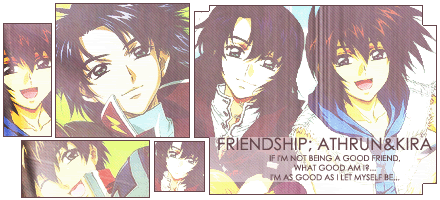
 |
|
|
|||
|
11-16-2007, 07:59 AM
oneesan is perfectly acceptable to call a young woman, at least around here. I regularly get called oniisan. You can also call old women obaasan and men ojiisan. ojisan and obasan are ok for obviously middleaged men and women, but better to use onee and onii for people who are in their thirties. They are still pretty age-consious and like to pretend to still be in their 20s.
But I'm with MMM in that oneechan is pretty much the beginning of a pickup or at least with a "you're cute" tone, even if no nampa is taking place. Usually the person saying it isn't sober. I've never said it sober, anyway, heh. |
|
||||
|
11-18-2007, 07:11 PM
Quote:
But I ask. Could you maybe give the romaji for these phrases as well? Because everyone might not know all of there characters. For example, I personaly don't know all my Kanjis I only 80 kanjis sofar.  |
|
||||
|
11-19-2007, 01:21 AM
Quote:
But anyway, here's one for the road. Kanjis that appeared above are: あの子 = anoko 厚くて= atsukute 壊れたか= kowareta 胸をこれ見よがしに突き出す= mune o kore miyogashi ni tsukidasu |
|
||||
|
01-25-2008, 09:28 PM
Regarding the usage of onii-chan/onee-chan...
In anime, small children seem to often use this to address a person in their teens or early twenties, i.e. still young enough as to concievably be a sibling. Does this actually happen? Or is it just an anime'ism? Also, in "Shakugan no Shana", there are two male characters about 16 years old who address an adult friend of theirs as "Marugori-neesan" (roughly, I think, 'Big sister Margery"). It could concievably fit with my first paragraph since the adult character looks to be about in her late twenties--not too big a stretch, I guess, for the sibling thing. Hey, I have a sister that's ten years older than me :P , and a brother that's fourteen older than I (who was just recently in Japan, lucky bastard). Whatever the case is, the consensus is that Gaijin should not use onee-chan on a Japanese girl? Ever? How about onii-chan? Or using san instead of chan? If you make people think they're thinking, they'll love you; but if you actually make them think, they'll hate you. ~Don Marquis Quote:
|
|
||||
|
01-29-2008, 06:17 PM
Quote:
Teens and young adults using nee/nii-san to a person not that’s not to fair out of there age group is mostly used for someone they know very well. And on occasion has been used as a pick up line to hit on girl. Sometimes you hear older men say this to younger girl. Its very rare and its sounds creepy to these girls. (My girlfriend told me about some old guy that said it to her and it freaked her out.) You don’t really hear girls saying nee-san to hit on guys though. As for us Gaijin’s we don’t really use it. It sounds really odd coming from a Gaijin if not just plain creepy. I my self have used it for one of my friends/teacher but I had gotten to know her a lot before that. (And was a bit of an inside joke.) For the most part you won’t use it unless you’re talking directly at your older sister/brother. (If they can understand Japanese) "To love is to suffer. To avoid suffering, one must not love. But then, one suffers from not loving. Therefore, to love is to suffer." |
|
|||
|
02-18-2008, 04:02 PM
On the topic of this whole Onee-chan/ Onee-san thing...
Wouldn't it be more appropriate to call an older girl or boy Ane-san(For girls)/Ani-san or aniki (For boys)? And on the subject of -chan in general, I have read that it is simply a word to be used towards close female friends. -kun is used towards male friends or people who are younger than you. (E.G., in Fruits Basket, Hatori refers to Tohru as "Honda-kun".) Really the most improper thing to call someone is their given name with no honorific. It is considered rude to do that without permission from the addressee. On the other side of the coin, if you have permission or are very close to this person (Lovers, spouses, very close friends) it can be considered a compliment, or show of affection to call their name without an honorific. I hope I got that right. I am very sorry if I did not. |
|
||||
|
02-18-2008, 10:41 PM
Quote:
About Ane-san/Ani-san it can be used at your own discretion. I believe that onii/onee are more poilte then ane/ani, but really its just a matter of choice. Aniki is a bit father out there, its more of people that you really know well. Often you hear this from yakuza, gangs (mostly from movies that I'v seen  ), or even high school students. ), or even high school students."To love is to suffer. To avoid suffering, one must not love. But then, one suffers from not loving. Therefore, to love is to suffer." |
 |
| Thread Tools | |
|
|